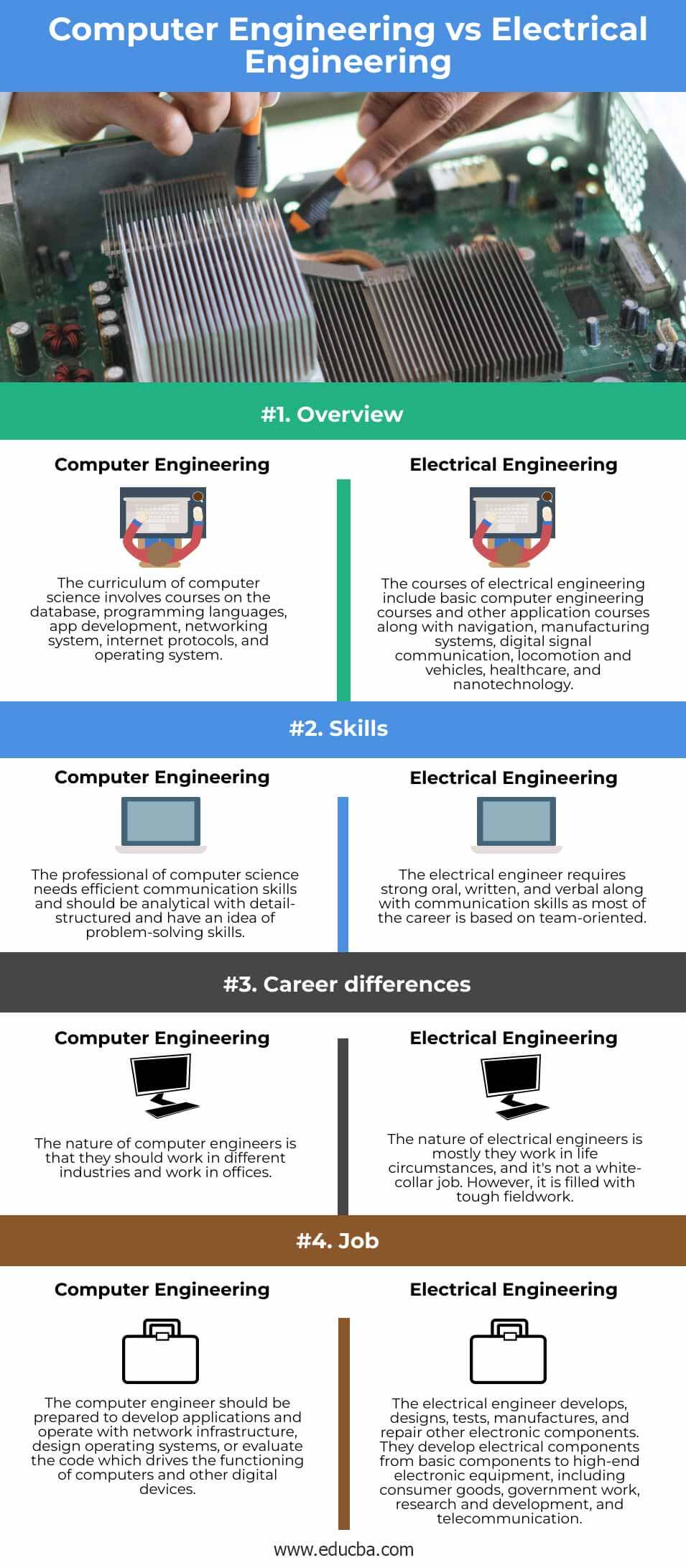
Difference Between Computer Engineering vs Electrical Engineering
Determining what a student wants to work on in computer technology is one way to start, but deciding which branch of computer technology to pursue can be complex. For those interested in the FE Electrical track, understanding the key differences between fields like computer engineering and electrical engineering is crucial. What sometimes makes it difficult to choose relies on their career and significant merits. For example, computer science offers better job growth and a high salary than electrical engineering, which enables less versatility and requires a graduate degree. On the other hand, though both fields have advantages and limitations, the benefits of selecting electrical engineering over computer engineering are substantial and not obvious. This Computer Engineering vs Electrical Engineering article briefly discusses the different perspectives of both fields.
Head-to-Head Comparison Between Computer Engineering vs Electrical Engineering (Infographics)
Below are the top 4 differences between Computer Engineering and Electrical Engineering:
Key Differences Between Computer Engineering vs Electrical Engineering
The major differences between both fields are coursework, salary, career differences, interest, and skills.
1. Course Work
The broad field of electrical engineering manages the generation of power, transmission, and conversion of electrical energy. It includes operating with electrical circuits and electronic components installed in office houses and functioning on power plants. The electrical engineer has the function of designing and implementing new electrical systems, testing components, and solving different problems. The specialization area finds everything from compact calculators to supercomputers, communication systems, wiring systems, and generators. Computer engineering is a section of electrical engineering, and as the name signifies, it includes different digital components fed with software programs.
A computer engineer should be responsible and skilled in computer architecture, hardware, IT security, networking, IT communication, and software engineering. Based on the field of specialization, the design should enhance computer hardware, implement and design the IT communication networks, or operate with developers to find flexible hardware with different types of software.
2. Salary
Both computer engineering and electrical engineering have varying pay maximum of $37,690 for all the job postings in America.
People should make deep arguments on passionate topics instead of merely selecting a job with a high salary. If the person is interested to learn complex theories, computer science is the best choice for him as it includes computer programming, numerical analysis, algorithm, and computational theories. But few people are attracted to computers as they are highly paid, and job growth is also rapid. But it doesn’t include any practical applications.
Electrical engineers utilize science, technology, and mathematical engineering to solve computer design problems and create programs to engage students who lack interest in algorithmic problem-solving. The electrical engineer develops the electrical component and tests their developed BLS designs. Their work makes a markable difference in the usage of computers from the circuit level to the integration of software and hardware systems.
3. Career
Electrical engineering is a career path that doesn’t require advanced degree courses. A bachelor’s degree will qualify for a beginner-level role in electrical engineering if the user wants to pursue any professional engineering license. When electrical engineer reaches graduate school, they choose to learn a doctorate or a master’s degree to develop more dedicated skills or train for any leadership roles; it is dedicated not only to finding a job. According to the BLS report, a master’s degree is required for information and computer research scientists.
But when it comes to the career path, the student should plan for an additional three years apart from the fundamental educational courses. This additional degree can add value to that basic bachelor’s degree but is rarely expensive. But if the student wants to work fast and earn a reasonable salary, interested in practical or real-time work, he could choose electrical engineering. The common career roles in computer engineering are computer system analyst, database admin, or software developer.
4. Courses
Computer and electrical engineering have a broad field of study with a narrow focus. Computer science majors concentrate on game development, mobile computing, cybersecurity, artificial intelligence, and machine learning. However, students should operate with computers and have difficulty switching to other careers.
One of the benefits of electrical engineering is it is broader than computer science. Electrical engineering students learn courses in electrical circuits, digital systems, computer engineering fundamentals, and electrical engineering depth. As BLS reports, computer science students also learn about electrical motors, communication systems, electronic components, and power generation systems.
Computer Engineering vs Electrical Engineering Comparison Table
Let us look at the comparison table of Computer Engineering vs Electrical Engineering.
|
Attributes |
Computer Engineering |
Electrical Engineering |
| Overview | The computer science curriculum involves courses on databases, programming languages, app development, networking system, internet protocols, and operating system. | Electrical engineering courses include basic computer engineering and other application courses, navigation, manufacturing systems, digital signal communication, locomotion and vehicles, healthcare, and nanotechnology. |
| Skills | The computer science professional needs efficient communication skills and should be analytical detail-structured, and have idea of problem-solving skills. | The electrical engineer requires strong oral, written, and verbal communication skills, as most careers are team-oriented. |
| Career Differences | The nature of computer engineers is that they should work in different industries and work in offices. | The nature of electrical engineers is mostly they work in life circumstances, and it’s not a white-collar job. However, it is filled with tough fieldwork. |
| Job | The computer engineer should be prepared to develop applications and operate with network infrastructure, design operating systems, or evaluate the code which drives the functioning of computers and other digital devices. | The electrical engineer develops, designs, tests, manufactures, and repairs other electronic components. They develop electrical components from basic components to high-end electronic equipment, including consumer goods, government work, research and development, and telecommunication. |
Conclusion
Computer and electronics engineering divisions are within the broader discipline of electrical engineering. Electrical engineering and the subject matter of computer science are considered the components that make up computer engineering.
Recommended Articles
We hope that this EDUCBA information on “Computer Engineering vs Electrical Engineering” was beneficial to you. You can view EDUCBA’s recommended articles for more information.

